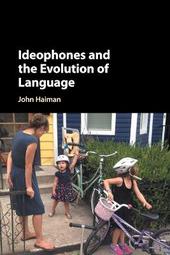
|
Ideophones and the Evolution of Language
Paperback / softback
Main Details
| Title |
Ideophones and the Evolution of Language
|
| Authors and Contributors |
By (author) John Haiman
|
| Physical Properties |
| Format:Paperback / softback | | Pages:393 | | Dimensions(mm): Height 229,Width 151 |
|
| Category/Genre | linguistics
Sociolinguistics
Historical and comparative linguistics
Semantics
Phonetics and phonology |
|---|
| ISBN/Barcode |
9781107695030
|
| Classifications | Dewey:417.7 |
|---|
| Audience | | Professional & Vocational | |
|---|
| Illustrations |
7 Line drawings, black and white
|
|
Publishing Details |
| Publisher |
Cambridge University Press
|
| Imprint |
Cambridge University Press
|
| Publication Date |
17 September 2020 |
| Publication Country |
United Kingdom
|
Description
Ideophones have been recognized in modern linguistics at least since 1935, but they still lie far outside the concerns of mainstream (Western) linguistic debate, in part because they are most richly attested in relatively unstudied (often unwritten) languages. The evolution of language, on the other hand, has recently become a fashionable topic, but all speculations so far have been almost totally data-free. Without disputing the tenet that there are no primitive languages, this book argues that ideophones may be an atavistic throwback to an earlier stage of communication, where sounds and gestures were paired in what can justifiably be called a 'prelinguistic' fashion. The structure of ideophones may also provide answers to deeper questions, among them how communicative gestures may themselves have emerged from practical actions. Moreover, their current distribution and behaviour provide hints as to how they may have become conventional words in languages with conventional rules.
Author Biography
John Haiman is the author of Hua: A Papuan Language of the Eastern Highlands of New Guinea (1980), The Rhaeto-Romance Languages (with Paola Beninca, 1992) and Cambodian: Khmer (2011). He pioneered the resurgence of interest in iconicity in language with Natural Syntax (Cambridge, 1985), and was awarded a Guggenheim Fellowship 1989 for the study of sarcasm, which resulted in his book Talk Is Cheap (1998).
Reviews'This is a splendid book - lively and stimulating, presenting the ideophone as a source in language phylogenesis and a new role for play in fostering the distinction between 'doing' and 'showing' at the origin. Haiman's style, erudition, and provocative hypothesis invite one into a joyful discussion.' David McNeill, University of Chicago
|